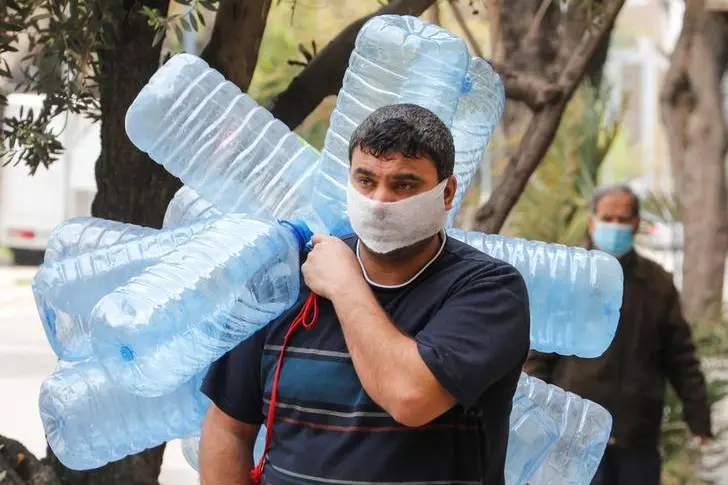PHOTO
BEIRUT: As shortages of all kinds plague Lebanon, water is fast becoming top of the list. Household tanks are drying up as water providers are unable to pump water and maintain sanitation systems.
A report released in July by UNICEF has warned that 71 percent of the population could run out of water. With state electricity almost nonexistent and generators only operating a few hours a day, the number of areas reporting worsening water shortages has gone up.
Every day, the number of affected families fluctuates slightly depending on fuel availability, network breakdowns etc., but up to 2.5 million people might be already affected, UNICEF Deputy Representative Ettie Higgins told The Daily Star. We are witnessing an increase in the price of water trucking in some areas by up to 12 times. Most shops in Beirut and the surrounding suburbs are also out of stock of bottled drinking water.
The water sector is being squeezed to destruction by the current economic crisis in Lebanon, unable to function due to the dollarized maintenance costs, the collapse of the power grid and the threat of rising fuel costs, she added. As access to clean water and energy diminishes daily, everyone in Lebanon is living the consequences, regardless of income.
Most of Lebanons water is provided by four water establishments North Lebanon, Mount Lebanon, Bekaa and South Lebanon with the rest made up using water trucking, illegal tapping and private or municipal sources.
On July 9, the North Lebanon Water Establishment announced a state of emergency, and began a water rationing programs. In a statement, they referred to the economic conditions the country is facing, including the negative impact of the large increase in the prices of materials, spare parts and oil derivatives, the unprecedented cuts in the electricity supply, the scarcity of diesel and gasoline on the market, the decline in the readiness and ability of electric generators to bridge the power shortage."
On the same day, the Bekaa Water Establishment said that due to power outages at the pumping stations in Zahle, water could no longer be pumped to certain areas of the Bekaa.
So far, water providers have managed to keep providing rationed water by receiving subsidized fuel, delaying urgent maintenance and international donor support. As fuel subsides continue to be lifted, UNICEF estimates that the establishments relying on fuel to run generators could cease operations in a matter of months in Beirut and Mount Lebanon, followed shortly by the rest of the country.
Some 1.7 million people could soon receive less than 35 liters of water a day, against Lebanons average rate per capita of 165 liters. Though these people are in the highest critical category, about a further 2 million people are ranked between critical and highly critical water access. Some areas of Beirut only receive water twice a week and as households start trying to reduce water consumption, the first thing affect is hygiene one step closer to dangerous health hazards.
The immediate adverse effect is on public health. Hygiene is compromised, and Lebanon would see an increase in diseases exacerbated by the dry season, Higgins said. Women and adolescent girls are facing particular challenges to their personal hygiene, protection and dignity without access to safe sanitation.
With COVID-19 cases on the rise again due to the Delta variant, Lebanons health system may be unable to cope, she added. Hospitals and other essential public facilities are cutting services and our estimation is that people are being forced to resort to unsafe and costly sources of water, putting childrens health and hygiene at risk this situation could affect more than 4 million people.
The lack of access to safe water services for a prolonged period would very likely lead to waterborne disease outbreaks, including diseases long since eradicated in Lebanon, such as cholera.
UNICEF has formed teams of contractors with supplies to bring back water to areas that have been cut off, as well as released an appeal for $40 million to cover a year of support of the four establishments.
Following the Beirut Port explosions in August 2020, UNICEF also reconnected 155 buildings to the public water systems, installed 873 water tanks in damaged households, and distributed over 4,000 hygiene kits and about 500 baby kits distributed to affected families.
To avoid the complete collapse of water establishments as a result of the economic crisis, since October 2020, UNICEF has supported them with supplies, consumables, and quick repairs to secure water services to more than 4 million people in Lebanon, Higgins said. Over 184,690 people reached with critical WASH supplies, including hygiene items and services. Nearly 200,000 people were assisted with temporary access to an adequate quantity of safe water for drinking and water for domestic use.
While NGOs can attempt to plug gaps, Lebanon is set to sink deeper into its water crisis unless state help is provided.
Copyright 2021, The Daily Star. All rights reserved. Provided by SyndiGate Media Inc. (Syndigate.info).





















